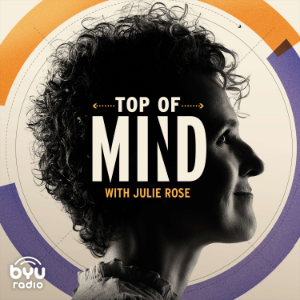
Top of Mind with Julie Rose
World News
Tackling tough topics in a way that will help you feel more empathy and empower you to become a better citizen, kinder neighbor, and more effective advocate. For people who are turned off by the divisive nature of the news, but still want to engage with important issues. Hosted by journalist Julie Rose, Top of Mind is a production of BYUradio.
Location:
Provo, UT
Genres:
World News
Description:
Tackling tough topics in a way that will help you feel more empathy and empower you to become a better citizen, kinder neighbor, and more effective advocate. For people who are turned off by the divisive nature of the news, but still want to engage with important issues. Hosted by journalist Julie Rose, Top of Mind is a production of BYUradio.
Language:
English
Website:
http://byuradio.org/
Email:
byuradio@byu.edu
Too Hot to Handle? America’s Deadly Heat Problem
Duration:00:41:28
Does America Have a Balance of Power Problem?
Duration:00:53:58
Can Free Housing Solve Homelessness? The Housing First Experiment
Duration:00:52:04
Feeling Unheard by Congress? Here's What You Need to Know.
Duration:00:40:27
Should Kids Have Smartphones in the Classroom?
Duration:00:41:09
Who Counts as American? The Birthright Citizenship Debate
Duration:00:53:59
Rethinking Drinking: America’s Evolving Relationship with Alcohol
Duration:00:53:50
The Unfinished Business of School Integration in America
Duration:00:53:52
BONUS: The Credit Card Debt Conversation - A Closer Look at the Role of Credit Counseling
Duration:00:21:24
Making Sense of America’s Credit Card Debt
Duration:00:54:06
ISIS and the New Threat of Radicalization in America
Duration:00:54:17
Americans Are Reading Fewer Books Than Ever. Does That Matter in 2025?
Duration:00:54:06
America is Rethinking Public Education. What Will the Future of School Look Like?
Duration:00:54:15
Is Marijuana Legalization Working Out Like We Thought it Would?
Duration:00:54:17
What A Surprising Friendship Can Teach Us about Gun Violence in America
Duration:00:54:13
Is AI killing our creativity?
Duration:00:53:52
Free Speech on Campus: Protect Students or Speech?
Duration:00:54:26
How Do We Solve Loneliness in America?
Duration:00:54:17
What is Intelligence? How the IQ Test Matters, Even When You Don’t Know Your Score
Duration:00:54:00
The Surprising Truth About Reconciliation After Estrangement
Duration:00:53:56